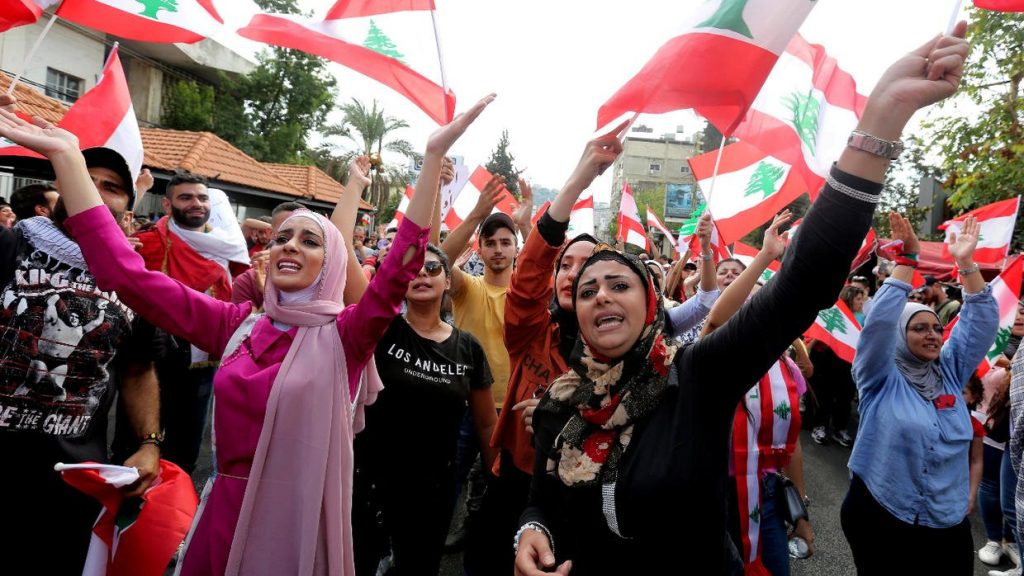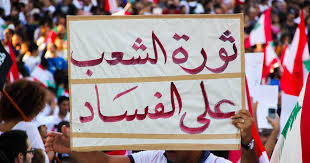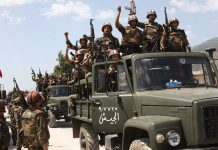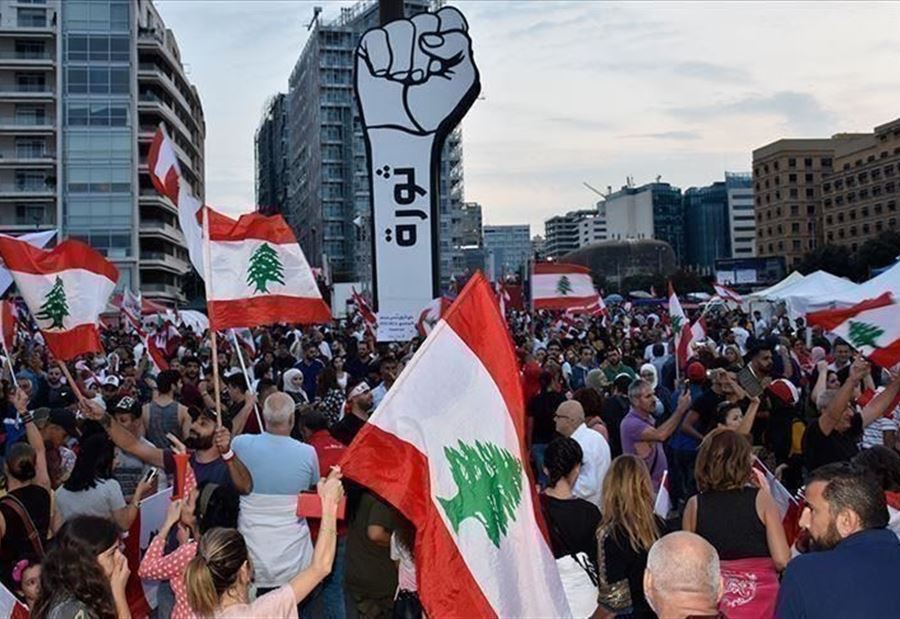A Bundle Of English Reports, News and Editorials For 01-02/2020 Addressing the On Going Mass Demonstrations & Sit In-ins In Iranian Occupied Lebanon in its 108th Day
Compiled By: Elias Bejjani
February 02/2020
Titles For The Latest English LCCC Lebanese & Lebanese Related News & Editorials published on February 01-02/2020
Hitti from Cairo: To fortify the “Arab House”, support the Palestinian position
Diab forms a committee to follow up on Corona virus preventive measures
Diab to Labor Union: Your participation in bearing the burdens is a national responsibility
Wazni: Policy Statement to Be Ready Monday
Lebanon to decide on circular regulating ‘bank-customer’ relationships – report
Report: Central Bank Measures Could ‘Ease’ Concerns
“No bankruptcy,” says El-Khalil
Report: Fahmi Adopts New Plan to Deal with ‘Non-Peaceful’ Protesters
Beirut’s demonstrations end with no confrontations
Protest march sets out from Sassine Square towards Riad El Solh
Two marches set out from General Labor Union and BDL towards Riad El Solh
Abou Al-Hassan: Giving the government a chance does not mean giving it confidence
Hbeish: We decided to partake in the confidence session and oppose the government from within the parliament
Public Works Ministry instructs Beirut & Tripoli Ports not to allow the Chinese ship to anchor until its safety is confirmed
Aoueidat requests judicial authorities to look into issue of judges obtaining free services from Ogero
Kuwaiti Prince to Jumblatt: Our position is firm in supporting Lebanon
Jumblatt: There is an impression that Turkish ships have become EDL’s property
El-Sayed: Who believes Riad Salameh?
Report: Lebanon Discusses US Mideast Plan at Arab League Emergency Meeting
Jumblat: Policy Statement Should Clearly Define How to Reform Electricity Sector
Lebanon’s government takes office amid uncertainty, opposition/Samar Kadi/The Arab Weekly/February 01/2020
Protesters march in Lebanon to reject new government/Associated Press /February 01/2020
Details Of The Latest English LCCC Lebanese & Lebanese Related News & Editorial published on February 01-02/2020
Hitti from Cairo: To fortify the “Arab House”, support the Palestinian position
NNA/February 01/2020
Lebanese Foreign Minister Nassif Hitti, on Saturday, stressed the need to strengthen the “Arab House” and to support the Palestinian stance, calling for international action at all levels to achieve peace in Palestine. In his address at the emergency meeting of the Arab Foreign Ministers devoted to discussing the American peace plan, or the so-called “deal of the century”, at the headquarters of the Arab States League in the Egyptian capital, Cairo, Minister Hitti said that “Lebanon is committed to the Arab peace initiative that emerged from the Arab Summit in Beirut in 2002, on the basis of a legal vision, be it the principles of international law or the relevant Security Council and United Nations resolutions; and also on a realistic vision based on a legal position that leads to the establishment of an independent Palestinian state, with East Jerusalem as its capital, alongside the Palestinians’ right to return to their homeland and reject resettlement.”“In order for the settlement to be permanent it must be fair, and to be fair it must be comprehensive,” Hitti went on. “In the lessons of the past during the interim negotiations, we detected from the very beginning how Israel continuously attempted to empty these negotiations of their content and remove them from its path,” he said. The Minister deemed in his word that “dropping the rules and principles of international law and the relevant United Nations resolutions, in order to address the settlement of international conflicts and disputes, would result in a system of international chaos, the price of which will be borne by all throughout the world, and in all kinds of existing conflicts and disputes.”Hitti concluded by reiterating the need to fortify the Arab family, which denotes a “fortification of all our national houses,” and to provide all kinds of support for the Palestinian position, and to move internationally at all levels to work towards achieving peace according to international references and the Arab peace initiative.
Diab forms a committee to follow up on Corona virus preventive measures
NNA/February 01/2020
Prime Minister Hassan Diab issued Saturday decree no. 9/2020, which stipulates forming a committee to follow up on the preventive measures and procedures adopted for the Corona virus.
The committee will be headed by the Secretary General of the Supreme Council of Defense and will be comprised of representatives of departments and agencies delegated to the membership of the national committee tasked with developing emergency plans to face disasters of all kinds. In this context, the committee will include representatives of the Ministries of Public Health, Higher Education, Agriculture, Public Works and Transport, Foreign Affairs and Social Affairs, as well as the Internal Security Forces, the Lebanese Red Cross, and the Disaster Risk Management Unit Director at the Council of Ministers’ Presidency. The committee’s mission would be to consolidate the efforts of the concerned departments and ministries in preparing to face the possibility of the virus’ spreading, identifying the virus spread scenarios and taking precautionary measures in public facilities (such as the airport, schools and various public places). The committee will also determine the needs at the national level in the event of a virus outbreak, prepare a plan for communication and coordination with regional and international partners in the areas of combating cross-border epidemics, and set a mechanism for requesting external assistance when needed. It will be responsible as well for disseminating accurate information to citizens through all means of audio-visual communication and social media platforms. In this framework, the committee will be required to submit a weekly report to the Premiership.
Diab to Labor Union: Your participation in bearing the burdens is a national responsibility
NNA/February 01/2020
Prime Minister Hassan Diab called on the General Labor Union to “cooperate in the next stage to alleviate the repercussions of the social and daily living crisis that Lebanon is witnessing,” considering that “the Union’s participation in bearing the burdens is a major national responsibility.”
Diab’s words came during his meeting with a General Labor Union delegation who visited him at the Grand Serail this afternoon, with talks centering on the country’s economic situation and labor demands. “I know the extent of the pressures, the economic and daily living burdens, and the conditions of workers and employees…and I know very well the extent of unemployment and how high the poverty rates,” said Diab, praising the Labor Union’s “responsible positions in wake of the country’s difficult circumstances.”In turn, the Union delegation affirmed their confidence in the Prime Minister, stressing that “honorable people stand beside him to endure and overcome the difficult stage.”
Wazni: Policy Statement to Be Ready Monday
Naharnet/February 01/2020
Finance Minister Ghazi Wazni announced that the government’s policy statement will be ready on Monday, adding that a BDL circular regulating bank-customer relations has been issued, LBCI TV station said Saturday. In remarks to the station, Wazni said the government shall finish discussing the ministerial statement “it will be ready on Monday.”He added: “We did receive a circular from the central bank regulating relations between banks and customers,” noting that “a decision will emerge in the next few days on that.” According to reports, BDL circular speaks of new measures to ease financial and monetary concerns as the country grapples with an economic and liquidity crisis. Wazni had met with Head of the Association of Banks in Lebanon Salim Sfeir on Friday who assured that bank deposits are safe and there are no plans to impose haircut on deposits.
Lebanon to decide on circular regulating ‘bank-customer’ relationships – report
NNA/February 01/2020
The Lebanese government has received a central bank circular aimed at regulating the relationship between banks and their customers and will study and decide on it within days, Finance Minister Ghazi Wazni told broadcaster LBC on Saturday. LBC earlier cited central bank governor Riad Salameh as saying the circular had been submitted to Prime Minister Hassan Diab and Wazni 10 days ago. If they agreed to it, the circular “would not include any exceptional measures”, Salameh said. “Operations will continue in the banks as usual,” he said. The aim was for “equal and fair treatment among all customers”. —Reuters
Report: Central Bank Measures Could ‘Ease’ Concerns
Naharnet/February 01/2020
Central bank governor Riad Salameh intends to take some “important” measures in agreement with local banks, and under a political cover, within the exceptional powers granted to him by the Monetary and Credit Law / Article 174, al-Liwaa daily reported on Saturday.
According to the daily, the measures entail:
-Setting a withdrawal limit on dollars of up to $1000 per week instead of 200 or 300 provided that the total withdrawal amount does not exceed $6000 per month.
– Setting the price of one dollar in banks at 2,000 Lebanese pounds in order to keep dollars in banks and prevent dollar run to the black market.
-Providing the necessary credit facilities for the purchase and import of food commodities such as sugar, rice, medical equipment, medicines, tools and supplies for industry in order to motivate the economy and production cycle, reduce unemployment, provide job opportunities for Lebanese youth, and reduce immigration.
– Dismiss completely the idea of haircut or deduction from the deposits of citizens, regardless of their size or quantity.
“No bankruptcy,” says El-Khalil
NNA/February 01/2020
MP Anwar El-Khalil said in a statement Saturday that “the talk about bankruptcy results from the lack of knowledge of the banking system.” “This crisis is a monetary and financial crisis, which can last for some time and can end with a quick decision, but certainly banks are not exposed to the problem of bankruptcy,” he asserted. El-Khalil cited herein Libya, Syria and Sudan as examples of countries that suffer financial and monetary problems, but have faced no bankruptcy. “The bankruptcy process is not as easy as it used to be,” the MP explained. “With regards to the Central Bank, it should not allow for any bankruptcy to occur and must work to save banks or merge them, because the bankruptcy of one bank drags other banks with it, since the chain effect process begins from one bank to another,” stated El-Khalil, noting that there should be no worry in this respect. “Yes, there is a state of financial stumbling,” he said; however, he indicated that “all Lebanese banks are having difficulty performing obligations in US dollars and not in Lebanese pounds.”
Report: Fahmi Adopts New Plan to Deal with ‘Non-Peaceful’ Protesters
Naharnet /February 01/2020
Interior Minister Mohammed Fahmi said he adopted a new strategy to deal with “non-peaceful” demonstrators, affirming that he fully supports the “rightful” demands of peaceful movements, the Saudi Asharq al-Awsat reported on Saturday. Fahmi said he set a new plan in place a “new strategy for dealing with non-peaceful demonstrators, not peaceful ones, to whom I belong in their rightful demands maintained by law in expressing opinion, sit-in, and peaceful demonstrations.” The Minister added that “rioters attack public property, private property and security forces which deviates the rightful demands of the movement. I don’t believe that road blockages are legitimate.” Over accusations fired at him by activists that he is trying to break up the protests, Fahmi said: “I do not intend to break up the movement and its rightful demands, but I want to protect the citizens and peaceful protesters and to prevent chaos in light of the painful situation we are in.” Last week Fahmi was slammed on social media over a security decision to remove barriers from the main protest square in downtown Beirut. Protesters said security forces embarked on removing the iron barriers at the entrance of Martyrs Square which Fahmi argued was “aimed at facilitating traffic in the capital.”
Beirut’s demonstrations end with no confrontations
NNA/February 01/2020
The protest marches that set out today from a number of Beirut neighborhoods, and met in Riad El-Solh Square in Central Beirut, ended in peace without registering any confrontations or provocations between the demonstrators and members of the security forces, with the exception of a number of demonstrators climbing the wall established by the security forces at the entrances of Nejmeh Square and the Government Serail, in objection to having barriers between the people and the authority, NNA correspondent reported.
Protest march sets out from Sassine Square towards Riad El Solh
NNA/February 01/2020
A protest march set out this afternoon from Sassine Square in Ashrafieh towards Martyrs Square in downtown Beirut, denouncing the arrest of a number of activists and confirming the continuation of the popular movements until achieving all of their demands.
A large banner reading, “No confidence”, preceded the demonstration march, as protesters called for “the thieves and the corrupt to be held accountable.”
The march will pass in front of the Palace of Justice building and then the Banks Association, before reaching the Martyrs’ and Riad El Solh Squares, where it will meet with the rest of the marches coming from several Lebanese regions.
Two marches set out from General Labor Union and BDL towards Riad El Solh
NNA/February 01/2020
A protest march set out this afternoon from outside the General Labor Union towards the Lebanese Electricity Company, all the way to the Riad El Solh Square, while another march set out from outside the Central Bank in Hamra, also heading to Riad El Solh, as protesters carried banners reading, “No confidence,” NNA correspondent reported.
Abou Al-Hassan: Giving the government a chance does not mean giving it confidence
NNA/February 01/2020
“Democratic Gathering” Secretary, MP Hadi Abou Al-Hassan, affirmed Saturday that “giving the government a chance does not necessarily entail giving it confidence.” “We will meet on Tuesday to discuss and decide whether the Democratic Gathering will give confidence or not, based on the government’s seriousness in its approach to the required reform, but we tend towards not giving it confidence,” he said in an interview with “MTV Station” this afternoon. “The government has to distance itself from regional conflicts, except for the Palestinian issue. As for what is happening between the United States and Iran, it does not concern us, because Lebanon, in its constitution, is an Arab country,” Abou Al-Hassan underlined. He stressed that Lebanon’s national interests ought to be prioritized, adding that the lesson from the government’s ministerial statement remains in its implementation. Touching on the Arab Foreign Ministers’ emergency meeting in Cairo, Abou Al-Hassan said: “The position of the Lebanese Foreign Minister today was important and reflects the position of the Lebanese people by returning to the Arab initiative and to international resolutions.”
Referring to the “Deal of the Century”, he stressed that “there must be a one united Palestinian stance,” calling for “fortifying the internal situation and having not fear of demographic change, while emphasizing the rejection of resettlement.” “The solution to everything that is happening in Lebanon lies in resorting to a civil state, passing a non-sectarian election law and forming a national body to abolish political sectarianism,” Abou Al-Hassan corroborated.
Hbeish: We decided to partake in the confidence session and oppose the government from within the parliament
NNA/February 01/2020
Future Parliamentary Bloc Member, MP Hadi Hbeish, disclosed Saturday that they have decided to participate in the “votes of confidence” session and to act as an opposition from within the Parliament. “Otherwise, boycotting the sessions for the remainder of the Parliament’s mandate would require the resignation of the deputies, as they are not allowed to refrain from carrying out their duties while getting paid their salaries and boycotting the sessions at the same time,” indicated Hbeish. “Additionally, it is illogical to leave the March 8th teams alone in Parliament to do whatever they wish over a period of two and a half years!” he exclaimed. “What is happening today in the country in terms of the economic and financial situation requires the search for exceptional ways to prevent the collapse of private institutions that have exhausted all their material and human capacities, and no longer have the ability to produce and continue their work, which leads to their closure and the loss of jobs by thousands of workers and employees,” warned Hbeish. The MP’s words came during his meeting with popular delegations who visited him at his Qbayet residence today.
Public Works Ministry instructs Beirut & Tripoli Ports not to allow the Chinese ship to anchor until its safety is confirmed
NNA/February 01/2020
In a press release by the Ministry of Public Works and Transport on Saturday, it announced that it has “given urgent instructions to the administrations of the Beirut and Tripoli Ports to refrain from receiving the Chinese ship coming to Lebanon, until confirmation of its safety and fulfillment of the health condition requirements is issued by the competent authorities, particularly the Ministry of Public Health.”
Aoueidat requests judicial authorities to look into issue of judges obtaining free services from Ogero
NNA/February 01/2020
Prosecutor General, Judge Ghassan Aoueidat, asked the judicial authorities to investigate the recent news reported by some media regarding Ogero’s placing of vehicles and toll-free phone numbers at the disposal of some judges, provided that investigations are conducted at the Central Intelligence Bureau under the supervision of Brigadier General Maurice Abu Zeidan.
Kuwaiti Prince to Jumblatt: Our position is firm in supporting Lebanon
NNA/February 01/2020
In a press release by the Progressive Socialist Party’s Information Office on Saturday, it indicated that the Party’s Chief Walid Jumblatt received a response cable from the Emir of the State of Kuwait, Sheikh Sabah Al-Ahmad Al-Jaber Al-Sabah, expressing his sincere appreciation for Jumblatt’s well-wishes and gratitude. The Emir thanked Jumblatt for commending Kuwait’s support extended to Lebanon, especially in the fields of humanitarian and development work, stressing “the firm position of the State of Kuwait in supporting the Lebanese brethrens in various domains.”“We ask the Lord Almighty to enable the sisterly Republic of Lebanon and its honorable people to achieve all progress and prosperity,” Al-Sabah concluded.
Jumblatt: There is an impression that Turkish ships have become EDL’s property
NNA/February 01/2020
Progressive Socialist Party Chief, Walid Jumblatt, criticized Saturday the Turkish ‘power ship’, saying via his Twitter account: “I hope that the ministerial statement includes the daily life requirements of the citizen and clearly defines how the electricity sector will be reformed, because there is a growing impression that Turkish ships have become the property of ‘Electricity of Lebanon’ Company.”
El-Sayed: Who believes Riad Salameh?
NNA/February 01/2020
MP Jamil al-Sayed tweeted, Saturday, on Central Bank Governor Riad Salameh’s reassurances that the official exchange rate of the Lebanese pound will be maintained, while the difference between the official rate and that of exchange dealers will be temporary, saying: “Who believes him? Until yesterday, Salameh was reassuring the Lebanese that the Lira was steadfast and in great condition…Then suddenly and at the first crisis, the protector of the Lira fell into contradictions, and it turned out that he was deluding the people! This fraud is called Ponzi.”
Report: Lebanon Discusses US Mideast Plan at Arab League Emergency Meeting
Naharnet /February 01/2020
Foreign Minister Nassif Hitti shall take part in the emergency Arab League meeting, held at the level of foreign ministers, to discuss the controversial Mideast plan revealed by US President Donald Trump this week where he will state Lebanon’s position, Nida al-Watan reported on Saturday.
In his first appearance at an international forum, Hitti, according to the daily, shall deliver Lebanon’s speech and will focus on Lebanon’s position and commitment to the Arab peace initiative adopted at the Arab Summit in Beirut in 2002, specifically the establishment of a fully sovereign Palestinian state with Jerusalem as its capital. The daily said, the minister will also stress that Lebanon is a peace-loving country and committed to a just and comprehensive solution within the terms of the Arab Peace Initiative in Beirut, which is based on a two-state solution and East Jerusalem as the eternal capital of the Palestinian people. Hitti shall stress that Lebanon adheres to any solution within Arab consensus, and that if Arabs manage to reach consensus on a decision, Lebanon will not break this consensus, said the daily. The foreign minister will also call for the formation of an Arab committee to follow up with the United States of America and urge it to amend the deal making it consistent with the Palestinian conditions. Lebanon’s basic requirement is that the Palestinians agree to a solution they deem appropriate because Lebanon will not go with any if they don’t. Hitti will also stress rejection of resettlements and will affirm the Palestinian right of return, concluded Nida al-Watan.
Jumblat: Policy Statement Should Clearly Define How to Reform Electricity Sector
Naharnet/February 01/2020
Progressive Socialist Party leader ex-MP Walid Jumblat on Saturday voiced hopes that people’s livelihood get addressed in the government’s awaited policy statement mainly the problematic electricity sector. In a tweet, Jumblat said: “Perhaps the policy statement would address the people’s livelihood which are increasing each day,” he said referring to an economic and financial crisis hitting the country. Jumblat also referred to the problematic energy sector in Lebanon saying the policy statement must “clearly specify how to reform the electricity sector in light of impressions that the Turkish (power) vessels are owned now by EDL (Electricity du Liban), and whoever who has monopolized them for years which explains high operation cost and outrageous profit.”
Lebanon’s government takes office amid uncertainty, opposition
*Samar Kadi/The Arab Weekly/February 01/2020
While Arab countries and the West do not want Lebanon’s collapse, they also do not want to support a government closely linked to Hezbollah.
BEIRUT – Lebanese Prime Minister Hassan Diab, whose cabinet took office January 23, is yet to submit its policy statement to parliament amid calls to deny his Hezbollah-backed administration a vote of confidence.
Stringent security measures were enforced around the parliament building, which was sealed off with concrete blocks, barbed wire and blast walls to deter anti-government protesters from reaching the building from adjacent Martyrs’ Square, a main protest hub in Beirut.
The deteriorating economic and financial situation was expected to top the government’s agenda but a cabinet stamped as a one-sided Hezbollah-led group will be unlikely to get badly needed Arab and international financial assistance.
“Challenges awaiting Diab’s administration are extremely difficult. They are rendered even more challenging because the government has no wide political cover and it is branded as pro-Hezbollah, even though it includes non-partisan and moderate figures,” said political analyst Johnny Mounayar.
“The future is blurred. Some people say the government won’t last long, while others, including Hezbollah, believe it will stay for a long while due to the extreme complexity of forming another administration.
“But, in order to help alleviate the acute financial crisis and shore up the economy, painful and unpopular fiscal measures will be unavoidable, a move that will further infuriate and alienate the people,” Mounayar said.
While the unprecedented street protests that have swept Lebanon since mid-October have tapered, opposition to Diab’s cabinet and public mistrust in its capacity to pull the country from its aggravating situation continue.
Washington and its Arab Gulf allies, which have long channelled funds into Lebanon’s fragile economy, expressed alarm at the rising influence of Hezbollah and its partners.
The US administration “will not” provide any kind of assistance for Lebanon’s new government because it considers it an “extension” of Hezbollah’s authority, local daily Nida Al Watan said quoting sources in Washington.
None of the Gulf Arab countries, especially Saudi Arabia and the United Arab Emirates, appears willing to step in to help heavily indebted Lebanon.
Mounayar said Lebanon is regarded as part of the confrontation of the United States and its Arab allies with Iran, now that it has officially fallen into the grip of the ruling majority led by Hezbollah.
“Only the European led by France might be willing to help contain the crisis through CEDRE conference on condition that the government introduces serious reforms, primarily in the electricity sector,” Mounayar said.
Foreign donors who pledged assistance for Lebanon at the CEDRE conference in Paris in 2018 have said any support depends on enacting long-delayed reforms.
While Arab countries and the West do not want Lebanon’s collapse, they also do not want to support a government closely linked to Hezbollah.
“No money will be coming for the time being. The future looks uncertain and I fear things would get worse,” Mounayar added.
Lebanon’s crisis is rooted in decades of official corruption and waste. A hard currency squeeze has pushed up prices, hit the Lebanese pound and driven banks to impose capital controls.
*Samar Kadi is the Arab Weekly society and travel section editor.
Protesters march in Lebanon to reject new government
Associated Press /February 01/2020
The national currency, which has been pegged to the dollar since 1997, lost about 60% of its value in recent weeks, sparking a run on banks which responded with limits on cash withdrawals and transfers.
BEIRUT: Hundreds of Lebanese marched on Saturday through the streets of the capital and the main northern city to reject a new government named to deal with an economic crisis, which they say lacks a popular mandate.
The new government named in January came after weeks of political stalemate and amid nationwide protests while Lebanon grappled with an unprecedented economic crisis. Backed by the two main blocs in parliament, the government is awaiting a vote of confidence, which it is likely to get. But protesters say the government is an extension of traditional political parties they have denounced as corrupt. “We are here today and every day … to say no confidence,” a protester who read a joint statement for the rallies said. It said the protesters won’t give another chance “to those who robbed them of their dreams, impoverished them, forced them to migrate, and humiliated them.” They vowed to keep up the pressure against a ruling class ”that controls decision-making and resources.”
Lebanon’s nationwide protests broke out Oct. 17 after a summer of discontent over a slumping economy and an austerity budget. The protests, sparked by proposals for new taxes, snowballed into demands for the ruling elite to step aside.
Lebanon’s ruling class has been in power since the end of the 1975-90 civil war, including some of its warlords. Protesters accuse them of mismanaging Lebanon’s wealth and of widespread corruption.
The new 20-member government of Prime Minister Hassan Diab was announced in late January but protests continued.
In recent weeks, demonstrations have turned violent as frustration rose. Security forces and protesters clashed outside the country’s parliament and the central bank in pitched street battles that left hundreds injured. Rights groups denounced the security forces’ use of rubber bullets to disperse the crowds. Over the last week, security forces erected blast walls around parliament and other government buildings, sealing them off from protesters and turning central Beirut into a fortified security zone.
On Saturday, protesters marched through the streets of Beirut and Tripoli, in the north, carrying banners against corruption and declaring “no confidence” in the new government. They stopped at the central bank, the Finance Ministry and the Banks Association before reaching central Beirut. The protesters gathered by the blast walls outside the parliament and the government building before dispersing peacefully. Lebanon has one of the world’s highest public debts, standing at more than 150% of gross domestic product. Growth has plummeted and the budget deficit reached 11% of GDP in 2018 as economic activities slowed and remittances from Lebanese living abroad shrank. The national currency, which has been pegged to the dollar since 1997, lost about 60% of its value in recent weeks, sparking a run on banks which responded with limits on cash withdrawals and transfers.






















